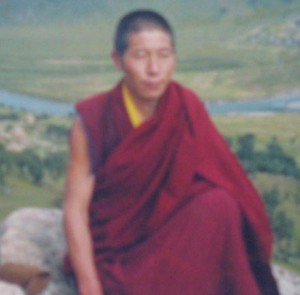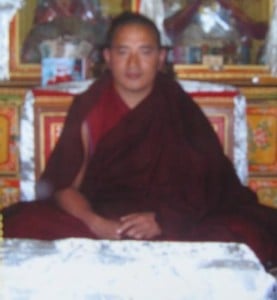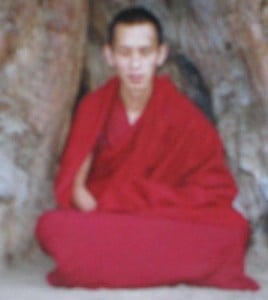 Jampel Wangchuk, disciplinarian at Drepung’s Loseling college.  Konchok Nyima, the scripture teacher at Drepung’s Gomang college.  Ngawang Choenyi, scripture teacher at Drepung’s Ngakpa college. |
Tibetans in Lhasa are concerned for the welfare and safety of three senior Drepung monks who were detained in April, 2008, two of whom have subsequently received sentences of life and 20 years. Their whereabouts and welfare is not known. The monks’ long sentences are in the context of a continued crackdown at Drepung, after monks from the monastery were at the forefront of peaceful protests in Lhasa beginning on March 10, 2008.
Jampel Wangchuk, 55, the disciplinarian at Drepung’s Loseling college, has been sentenced to life in prison, and Konchok Nyima, 43, the scripture teacher at Drepung’s Gomang college, has been sentenced to 20 years, according to information from ICT sources and the Tibetan Center for Human Rights and Democracy (TCHRD). A third monk, 38-year old Ngawang Choenyi, the scripture teacher at Drepung’s Ngakpa college, who was arrested at the same time, is also believed to be serving a sentence of 15 years, according to sources cited by the Tibetan government in exile. (CTA, China Reinforces Patriotic Education at Drepung Monastery: Report – January 14, 2009). Charges against the three monks are not known.
The three monks are highly respected scholars in their community (images of the three monks are at: www.https://savetibet.org). Although Drepung monks played a prominent role in a major demonstration on March 10, 2008, Jampel Wangchuk, Konchok Nyima and Ngawang Choenyi are not believed to have taken part in the protests. A source in contact with people in Lhasa said: “The implication is that the authorities used the cover of the protests to detain influential members of the Drepung community with no political record. There are serious fears for the welfare of these three monks.”
The whereabouts of two others from Drepung arrested at the same time, Ngawang Sertho and a cook nicknamed Gyakpa (literal translation: Fatso), are still unknown. A monk detained at the time, Gyalpo, died in prison following torture in August 2009, according to TCHRD. (TCHRD, Heavy sentences for Drepung monks – October 7, 2010.) The Tibetan government in exile has reported the sentencing of 42 monks from Drepung since March, 2008. (Central Tibetan Administration, China Reinforces Patriotic Education at Drepung Monastery: Report – January 14, 2009) The same report stated that Drepung monk Lobsang Wangchuk from Lhasa was left virtually blind after maltreatment in custody in an unknown location.
There has been an increase in the imposition of life sentences in Tibet since the crackdown began from March, 2008. Wangdu, a former Project Officer for an HIV/AIDS program in Lhasa run by the Australian Burnet Institute, was sentenced to life for “espionage” in Lhasa in 2008. (ICT report, NGO worker sentenced to life imprisonment: harsh sentences signal harder line on blocking news from Tibet – December 22, 2008) Respected Tibetan businessman, hotel owner and Communist Party member Dorjee Tashi has been sentenced to life after being held incommunicado after the 2008 protests. Monks Gyurmey Dhondup and Kalsang Tsering were sentenced to life in September, 2008, following alleged involvement in a bombing incident in Chamdo (Chinese: Changdu), Tibet Autonomous Region. (AsiaNews, Post-Olympics: more life sentences for Tibetan monks – October 16, 2008)
Prior to 2008, the influential religious teacher Tenzin Delek Rinpoche, who oversaw a religious revival among the communities in his area and established schools, old people’s homes and religious institutions, had a death sentence commuted to life following his detention in 2002 on alleged bombing charges. Monk Choeying Khedrub was sentenced on January 29, 2001 to life imprisonment by the Tibet Autonomous Region High People’s Court for the “crime of inciting splittism” after he was accused of printing and distributing pro-independence leaflets.
Drepung monks at forefront of cycle of protests
The cycle of protests that led to a violent crackdown across Tibet began with an orderly march to Lhasa by several hundred Drepung monks on March 10, 2008. The monks, already under heavy restrictions following their attempts to celebrate the awarding of the US Congressional Gold Medal to the Dalai Lama in October, a year before (ICT report, New images confirm security buildup at Drepung on day Dalai Lama awarded the Congressional Gold Medal – November 14, 2007), were blocked by security forces. Dozens were arrested after a standoff with security personnel following a sit-in protest by many of the monks, many of whom wept as they recited long-life prayers for the Dalai Lama, and the rest were compelled to return to the monastery.
Drepung monastery was blockaded by security forces following the incident and on April 10 and 11, 2008, military trucks were seen moving towards Drepung and the road to the monastery was closed again. Drepung monks were prevented from leaving the monastery to obtain food. Jampel Wangchuk, Konchok Nyima, and Ngawang Chonyi were detained on April 11, and it is still not known where they are detained. Jampel Wangchuk (layname: Tsepel), sentenced to life, is from Tsotoe in Phenpo Lhundrup (Chinese: Linzhou) county in the Tibet Autonomous Region (TAR). Konchok Nyima is from Ngaba (Chinese: Aba) in Sichuan, the Tibetan area of Kham. He was believed to have been sent back to his native place, like other Lhasa monks from outside the TAR, but never arrived. Ngawang Chonyi (layname: Kalden), is from Shasuzur neighborhood in Lhasa.
In April, 2008, hundreds of armed police raided Lhasa’s three main monasteries, Sera, Drepung and Ganden, already under lockdown and with a high security presence following the beginning of the protests in March. The raids took place in the early hours of the morning over several nights, and according to various reports, hundreds of monks were taken away. According to one report, around 600 monks were taken from Drepung at dawn on April 25, 2008, some with black hoods over of their heads. Many of them were taken to Golmud (Chinese: Ge’ermu) in Qinghai by train and held in a military prison. The authorities later said they had been “taken for study”.
The Tibetan writer Woeser wrote about a song written by a Drepung monk held in custody at Golmud at the time, which was based on a folk song popular in Amdo, eastern Tibet. The song was learnt by many monks being held in detention, and includes the lyrics: “The three seats of Sera, Drepung and Ganden[the three great monasteries of Lhasa]/ Are struck by the vapor of the poisonous snake/ Because of this sea of adverse circumstance/ There’s no right to diligently study the scriptural texts.” (ICT press release, A Great Mountain Burned by Fire: China’s Crackdown in Tibet – March 1, 2009)
Since the Drepung monks took to the streets on March 10, 2008 the Chinese government has engaged in a widespread cover-up of the torture, disappearances and killings that have taken place across Tibet combined with a virulent propaganda offensive against the Dalai Lama. As part of this offensive, officials have intensified the implementation of patriotic education campaigns in order “to offer legal education to monks because religious activities must also be considered under the framework of the law.” (Reuters, China scholars vow patriotism drive for Tibet – March 26, 2008) Patriotic education is carried out at Tibetan monasteries and nunneries in order to tighten Party control over religion and undermine the influence of the Dalai Lama in society and religious institutions, which includes requiring monks and nuns to sign public declarations denouncing the Dalai Lama.

